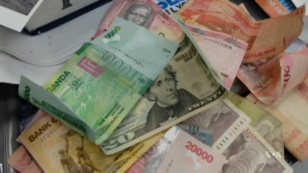VOA慢速英语:汇款很重要但会扭曲经济
- 参考译文
- 听力原文
Remittances Are Important But Distort the Economy
汇款很重要但会扭曲经济
From VOA Learning English, this is the Economics Report.
Many immigrants send small amounts of money - called "remittances" - home to friends and family. But those small amounts of money together add up to a lot, consider that there are about 200 million international migrants.
这里是VOA慢速英语经济报道。很多移民寄少量的钱给自己国家的朋友或家人,这叫“汇款”。但是考虑到有2亿的国际移民,你就会知道这些少量的钱聚集在一起就是很多钱。
In 2013, migrants around the world sent $400 billion back to their home countries, that is much more than official aid to many countries. For some nations, it is the biggest provider of foreign exchange.
在2013年世界各地的移民就寄回他们的祖国4000亿,这要比很多国家的官方援助多很多。对于一些国家来说,这些汇款就是他们最大的外汇来源。
Jean Claude Kazadi and his wife Myriam came to the United States from the Democratic Republic of Congo. They quickly began sending money home after they arrived. They wanted to help family members left behind.
让·克劳德·卡扎蒂和他的妻子米丽娅姆从刚果民主共和国来到美国。他们到那不久就开始往家里寄钱。他们想帮助留在刚果的家人。
"We believe in supporting each other. We believe in supporting our parents, specifically, and we believe in supporting our brothers and sisters," Kazadi said.
卡扎蒂说:“我们认为家人应相互扶持。更重要的是要赡养父母,照顾好兄弟姐妹。”
Jean Claude Kazadi is a doctor who works on HIV Aids for Catholic Relief Services in Maryland. He often visits the Democratic Republic of Congo, and he hopes he is helping Africans with his work. But he knows the $400 he sends to his parents every month is important.
让·克劳德·卡扎蒂是美国马里兰州的天主教艾滋病救济服务机构医生。他经常回刚果,他希望可以通过自己的工作来帮助非洲人。但是他知道他每月要寄给父母的400美元对父母很重要。
Economist Adolfo Barajas of the International Monetary Fund(IMF) has studied remittances for ten years. He has seen their effects on economies.
国际货币基金组织的经济学家阿道夫·巴拉哈斯研究汇款已经10年了,他深知汇款对经济的影响。
"They have been growing tremendously from 1990 to 2010; they grew more than sevenfold," Barajas said.
巴拉哈斯说:“从1990年到2010年汇款数目一直在急剧上升,已经增长了7倍多。”
Mr. Barajas says a huge migration has driven this flow of money to countries around the world. But he says there are problems with governments receiving large amounts of money. They may use the money less effectively.
巴拉哈斯先生称,大批的移民推动世界各国之间的资金流动。但是,这些接收到大量资金的国家政府存在问题,他们可能不能有效的利用这笔资金。
Economists have said that remittances help families who receive them by increasing their income. But there is a concern that the income into a national economy will cause its money to increase in value. In turn, a country's exports can become more costly and less competitively.
经济学家称,汇款可以帮助收到钱的家庭增加收入,但是也有令人担忧之处,就是汇款进入一个国家的经济体系,将会使这个国家的货币升值,反过来说就是,这个国家的出口商品会变得越来越贵,而且会越来越缺乏竞争力。
However, economists agree that remittances affect the receiving country's economy in good ways. Dilip Ratha is a remittance expert with the World Bank. He says remittances help improve people's lives.
然而,经济学家一直认为汇款会给接收汇款的国家带来好的影响。世界银行的汇款专家迪利普·拉塔说,汇款可以改善人们的生活。
"They provide incomes, they provide a lifeline for people, they reduce poverty, they provide funding for business investment, human capital investments, education, health," Ratha said.
拉塔说:“这些汇款会提高居民收入,为人们救急救难,缩减贫困,为人们商业投资,人力投资,教育,和医疗等提供了资金。”
Economists say that private investors leave when countries are in conflict. But Dilip Ratha says remitters like the Kazadis of the Democratic Republic of Congo continue to send assistance.
经济学家称,当一个国家处于战争冲突时,私人投资家会离开这个国家。迪利普·拉塔称,但是像刚果的卡扎蒂这样的汇款者会继续寄钱进行援助。
"Because that is precisely when the needs of the families left behind increase. And to meet those needs, migrants send money home," says Ratha.
拉塔说:“因为这个时候恰恰是家里人更需要援助的时候,为了满足家里人的需求,移民们就会往家里寄钱。”
For Myriam and Jean Claude Kazadi, it is a simple case of showing their parents that they have not forgotten them.
米丽娅姆和卡扎蒂的事,就是一个表示他们没有忘记父母的简单例子
And that is the Economics Report from VOA Learning English. I'm Mario Ritter.
以上就是今天的慢速英语经济报道,我是马里奥·里特。
Remittances Are Important But Distort the Economy
From VOA Learning English, this is the Economics Report.
Many immigrants send small amounts of money - called "remittances" - home to friends and family. But those small amounts of money together add up to a lot, consider that there are about 200 million international migrants.
 |
In 2013, migrants around the world sent $400 billion back to their home countries, that is much more than official aid to many countries. For some nations, it is the biggest provider of foreign exchange.
Jean Claude Kazadi and his wife Myriam came to the United States from the Democratic Republic of Congo. They quickly began sending money home after they arrived. They wanted to help family members left behind.
"We believe in supporting each other. We believe in supporting our parents, specifically, and we believe in supporting our brothers and sisters," Kazadi said.
Jean Claude Kazadi is a doctor who works on HIV Aids for Catholic Relief Services in Maryland. He often visits the Democratic Republic of Congo, and he hopes he is helping Africans with his work. But he knows the $400 he sends to his parents every month is important.
Economist Adolfo Barajas of the International Monetary Fund(IMF) has studied remittances for ten years. He has seen their effects on economies.
"They have been growing tremendously from 1990 to 2010; they grew more than sevenfold," Barajas said.
Mr. Barajas says a huge migration has driven this flow of money to countries around the world. But he says there are problems with governments receiving large amounts of money. They may use the money less effectively.
Economists have said that remittances help families who receive them by increasing their income. But there is a concern that the income into a national economy will cause its money to increase in value. In turn, a country's exports can become more costly and less competitively.
However, economists agree that remittances affect the receiving country's economy in good ways. Dilip Ratha is a remittance expert with the World Bank. He says remittances help improve people's lives.
"They provide incomes, they provide a lifeline for people, they reduce poverty, they provide funding for business investment, human capital investments, education, health," Ratha said.
Economists say that private investors leave when contries are in conflict. But Dilip Ratha says remitters like the Kazadis of the Democratic Republic of Congo continue to send assistance.
"Because that is precisely when the needs of the families left behind increase. And to meet those needs, migrants send money home," says Ratha.
For Myriam and Jean Claude Kazadi, it is a simple case of showing their parents that they have not forgotten them.
And that is the Economics Report from VOA Learning English. I'm Mario Ritter.
- 频道推荐
- |
- 全站推荐
- 推荐下载
- 网站推荐




















